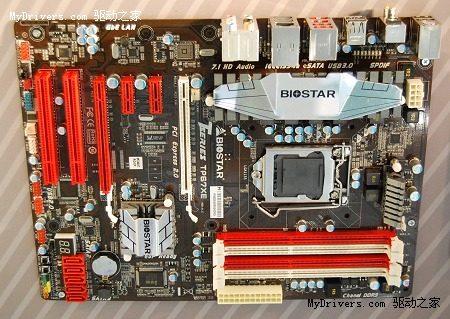SiSoft Sandra 2011 Benchmarks
As usual, we check out the CPU CLK that is running on the Biostar TP67XE board. A check using CPU-ID shows that it is running at 100.1MHz. The ASRock P67 Professional Fatal1TY runs at 100.2MHz while the ASUS P8P67Pro is at 100MHz on the dot. We included the benchmarks of ASRock P55 Deluxe running a Core i5 661 (3.33GHz) as a comparison of performance against to the new 32nm processor Core i5 2500K running at 3.3GHz.
As we can see from the chart below, the P55 only achieves 11.81GB/s with the same 2GB X2 DDR3 memory module running at DDR3-1333 C7-8-7-20-1T whereas the P67 boards are running 2x2GB DDR3-1866 at C7-8-7-20-1T. The three P67 boards are able to achieve around 25 GB/s which is quite impressive. The result closes up the gap with intel x58 which scores 30GB/s in this test.
Next we take a look at the Processor Arithmetic scores. All 3 boards and p55 Deluxe score quite closed to one another at 59.2 GOPS.

In terms of multimedia, the new processor is way ahead of the older P55 architecture. The BIOSTAR TP67XE is able to boost it’s speed to 95.42 ahead of the other two boards we tested before.
Transcoding is also improved, in fact doubled that of the Core i5 661. Although the processor has an inbuilt gpu, that function seems to be only available for the H67 chipset. It sped up the transcoding to almost 5MB/s. As for P67, it still uses the CPU and the average speed is 793KB/s on the BIOSTAR board.






[…] Posted by ugotd8 Biostar TP67XE. Don't sleep on it…That mobo is a good surprise OCWorkBench Review and Biostar TP67XE Compared Against Eight P67 Mobos __________________ NVIDIA GeForce […]
[…] the Biostar TP67XE…TomsHardware: P67 Motherboard Roundup And here's another review to read… OCWorkbench Review __________________ NVIDIA GeForce 9800GTX/9800GTX+ and GTS250 Owners Thread Don't care about […]
[…] https://en.ocworkbench.com/tech/biostar-tp67xe-intel-p67-express-sandy-bridge-mainboard-review-first-… […]